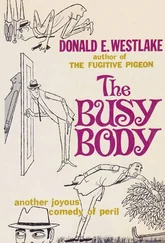Kelp said, "Will you at least listen to what Greenwood has to say? Give him the courtesy and listen for a minute."
"What can he say that I don't already know?"
"Well, that's kind of the point," Kelp said. He glanced in the rearview mirror again, then back at the street. He made a left turn and said, "It seems he held out on us a little."
"I didn't hold out," Greenwood said. "Not exactly. The thing was, I was embarrassed. I got played for a sucker, and I hated to tell anybody about it until I could make up for it. You know what I mean?"
Dortmunder looked at him. "You told Prosker," he said.
Greenwood hung his head. "It seemed like a good idea at the time," he mumbled. "He was my attorney and all. And the way he explained it, if something went wrong while you guys were springing me, he could anyway get his hands on the emerald and turn it over to Iko and use the money to try to spring the whole bunch of us."
Dortmunder made a sour face. "He didn't sell you any gold mine stock, did he?"
"It seemed reasonable," Greenwood said plaintively. "Who knew he'd turn out to be a thief?"
"Everybody," Dortmunder said.
"That isn't the point," Kelp mentioned. "The point is, now we know who has the emerald."
"It's been over three weeks," Dortmunder said. "How come it took so long to deliver the news?"
Greenwood said, "I wanted to try to get the emerald back by myself. I figured you guys did enough, you went through three operations, you sprang me out of prison, I owed it to you to get the emerald back from Prosker myself."
Dortmunder gave him a cynical look.
"I swear," Greenwood said. "I wasn't going to keep it for myself, I was going to turn it over to the group."
"That's neither here nor there," Kelp said. "The point is, we know Prosker's got it. We know he didn't turn it over to Major Iko, because I checked with the Major this morning, which means he's holding on to it till the heat's off and then he'll peddle it to the highest bidder. So all we got to do is go take it away from Prosker, turn it over to Iko, and we're back in business."
"If it was that easy," Dortmunder said, "Greenwood wouldn't be here without the emerald."
"You're right," Greenwood said. "There's a little problem."
"A little problem," said Dortmunder.
"After we didn't find the emerald at the police station," Greenwood said, "naturally I went looking for Prosker."
"Naturally," said Dortmunder.
"He disappeared," Greenwood said. "He was away from the office on vacation, nobody knew when he was due back. His wife didn't know where he was, she thought he was off shacked up with somebody's secretary. That's what I've been doing the last three weeks, trying to find Prosker."
Dortmunder said, "So now you want the rest of us to help you look."
"No," said Greenwood. "I found him. Two days ago, I found out where he was. The problem is, he's going to be a little bit difficult to get at. It's going to take more than one man."
Dortmunder lowered his head and put a hand over his eyes. "You might as well go ahead and tell me," he said.
Greenwood cleared his throat. "The same day we knocked over the police station," he said, "Prosker committed himself to an insane asylum."
There was a long silence. Dortmunder didn't move. Greenwood watched him worriedly. Kelp alternately watched Dortmunder and the traffic.
Dortmunder sighed. He lowered the hand from his eyes, lifted his head. He looked very tired. He reached forward and tapped Kelp on the shoulder. "Kelp," he said.
Kelp looked in the rearview mirror. "Yeah?"
"Please take me back to the dog. Please."
Dortmunder's New York probation officer was an overworked and undermotivated balding man named Steen. Two days after Dortmunder was rescued from the dog by Greenwood and Kelp, he sat for one of his regular interviews in Steen's office and Steen said, "Well, it looks as though you're really going straight this time, Dortmunder. That's very good."
"I've learned my lesson," Dortmunder said.
"It's never too late to learn," Steen agreed. "But let me give you one little piece of friendly advice. In my experience, in the experience of this office and generally, the thing you've got to look out for most of all is bad companions."
Dortmunder nodded.
"Now," Steen said, "that may seem like a strange thing to say to a man your age, but the fact of the matter is, more recidivism is caused by bad companions than just about any other factor. You want to remember that, in case any of your old chums ever come to you with that just-one-more-job that's supposed to put you on Easy Street."
"I already turned 'em down," Dortmunder said heavily. "Don't you worry."
Steen looked blank. "You what?"
"I said no."
Steen shook his head. "No what?"
"No, I wouldn't do it," Dortmunder told him. He looked at Steen and saw that Steen remained unenlightened, so he told him, "The just-one-more-job guys. I told them no dice."
Steen gaped at him. "You were approached? For a robbery?"
"Sure."
"And you turned it down?"
"Damn right," Dortmunder said. "There comes a point when you got to give anything up as a bad job."
"And," said Steen, so stunned his voice was cracking, "you're reporting it to me? "
"Well, you brought it up," Dortmunder reminded him.
"That's right," Steen said, in a vague sort of way. "I did, didn't I?" He gazed around the bleak battered office with its grimy furniture and the faded inspirational posters on the walls, and his eyes were shining with an unaccustomed glow. He could be seen to think, It does work! The whole probation system, the paperwork, the irritation, the crummy offices, the surly parolees, by God it works ! A parolee has actually been approached to take part in a crime, and has actually turned it down, and has even reported it to his probation officer! Life does have meaning after all!
Gradually Dortmunder began to grow impatient. He cleared his throat. He tapped his knuckles on the desk. He developed a coughing fit. Finally he said, "If you don't need me any more-"
Steen's eyes slowly refocused on him. "Dortmunder," he said, "I want you to know something. I want you to know you have made me a very happy man."
Dortmunder had no idea what the hell he was talking about. "Well, that's good," he said. "Any time I can help out."
Steen cocked his head to one side, like that dog the other day. "I don't suppose," he said, "you'd want to tell me the names of the people who contacted you?"
Dortmunder shrugged. "It was just some people," he said. He was a little sorry now he'd brought it up. Usually he wouldn't have, but this emerald business had gotten him rattled over the last few months, and the habits of a lifetime were gradually going to hell. "Just some people I used to know," he amplified, to make it clear he wasn't saying any more than that.
Steen nodded. "I understand," he said. "You still have to draw the line somewhere. Still, this has been a red-letter day for crime prevention, I want you to know that. And for me."
"That's good," Dortmunder said. He wasn't following, but it didn't matter.
Steen looked down at the paperwork on his desk. "Well, let's see. Just the usual questions left, I guess. You're still going to that machinists' school?"
"Oh, sure," Dortmunder said. There was no machinists' school, naturally.
"And you're still being supported by your cousin-in-law, is that right? Mr. Kelp."
"Sure," Dortmunder said.
"You're lucky to have such relatives," Steen said. "In fact, I wouldn't be surprised to hear that Mr. Kelp had something to do with what you told me here today."
Dortmunder frowned at him. "Oh, yeah?"
Steen, smiling happily at his paperwork again, didn't catch the expression on Dortmunder's face, which was just as well. "Well, that's about it for this time," he said and looked up, and Dortmunder's face had no expression at all.
Читать дальше












